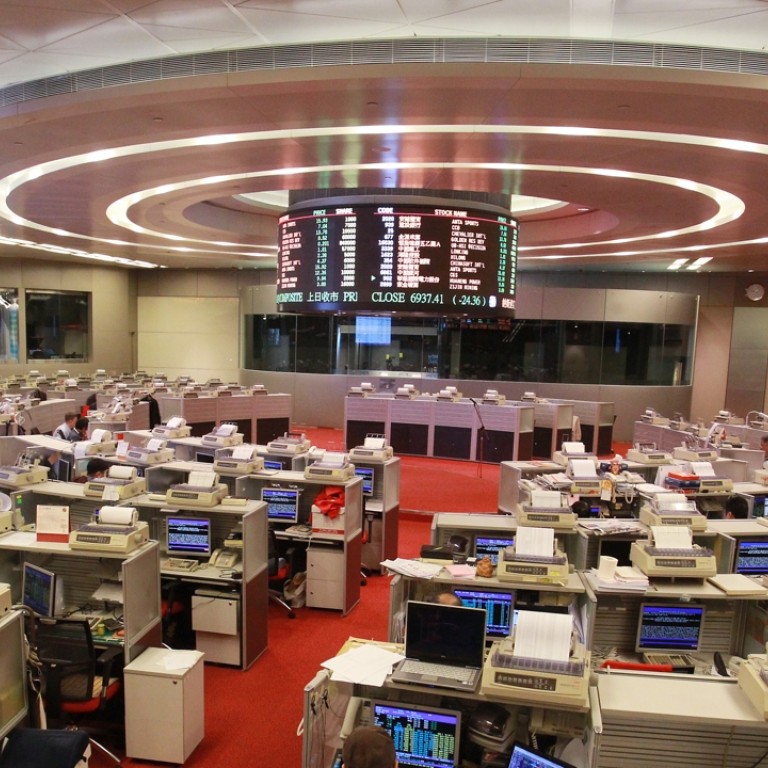
Update | China’s ‘national team’ pushes Shanghai benchmark up before IMF’s yuan decision on SDR
Yuan softens as Shanghai index rises 3.23 per cent in November; Hong Kong’s Hang Seng Index slides 2.84 per cent on the month
China’s national team rushed to the stock market to buy bank shares late on Monday, nudging the Shanghai benchmark to close marginally higher and erase midday losses of 3 per cent ahead of the IMF decision to add the yuan into its Special Drawing Rights basket later in the day.
The benchmark Shanghai Composite Index eked out a gain of 0.26 per cent or 9.10 points to finish at 3,445.41. The index gained 3.23 per cent this month, sharply off from the October increase of 10.80 per cent. The CSI300 Index crawled up 0.26 per cent, or 9.42 points to 3,566.41.
Hong Kong’s stock market traded sideways in a narrow band, as investors folded their arms to wait for the final decision from the IMF.
The Hang Send Index closed 0.33 per cent, or 71.90 points lower at 21,996.42, posting a monthly drop of 2.84 per cent. The H-share Index tracking mainland based Chinese companies lost 0.66 per cent, or 65.02 points, to 9,790.64.
The Shenzhen Composite Index advanced 0.89 per cent, or 19.49 points to 2,203.61. The Nasdaq-style ChiNext rose 0.87 per cent, or 23.03 points to 2,672.58.
Kevin Leung, a strategist with Haitong International Securities in Hong Kong, said unless “unexpected” things happen overnight with the IMF’s final decision, the Hong Kong market would be stable, “as many investors have priced in an inclusion of yuan”.
“Another thing needs to be watched out for is the Fed’s decision on December 16. Investors are still divided in expectations, and a decision to hike or not will bring some volatility to Hong Kong.”
Eric Wu, a private equity analyst based in Shanghai said the “national team”, referring to companies including the China Securities Finance Corporation which have been propping the market with rescue funds since the stock meltdown over the summer, was buying up blue chips to support the indices as the authorities were trying to prevent a slump in sentiment.
Last Friday, the mainland markets posted their biggest daily loss since August, after three of the 10 biggest brokerage companies reported they were under investigation by regulator the China Securities Regulatory Commission (CSRC), suspected for breached securities regulation.
Ten mainland based companies began taking subscriptions for initial public offerings since this Monday, becoming the first batch to go public after a four-month hiatus.
Russ Koesterich, Chief Investment Strategist of BlackRock, said despite some signs of stabilisation, the Chinese markets were still vulnerable to transparency issues.
“Markets were hurt by more headlines concerning investigations into brokerage firms, a sharp drop in industrial profits and more evidence of firms struggling under heavy debt burdens. This reinforces a long-held concern over China’s domestic markets. Investors remain unsure of the regulatory environment and the scope of China’s bad debt problem,” he wrote in a note issued Monday.
Credit Suisse said in a report that it expected a “long winter” for the Hong Kong economy, which would be affected by a US interest rate rise next month and the slowdown in the mainland economy, with property and retail stocks likely to be most affected next year.
Christopher Cheung Wah-fung, the Hong Kong legislator representing brokers, said stock markets might face some uncertainty but should bounce back after the IMF meeting in Washington on Monday to vote on adding the yuan to the SDR basket, joining the US dollar, euro, yen and pound.
“If the IMF decides to let the yuan join the SDR, it will be very positive news to the stock market,” Cheung said. “If the yuan becomes a reserve currency, it would speed up China’s opening up of the capital market and hence add to the chances for the Hong Kong and Shenzhen stock connect to be launched sooner.”
All the listed banks saw their prices rise in Shanghai and Shenzhen. Bank of China closed 4.05 per cent higher to 4.11 yuan (HK$4.98) in Shanghai. Bank of Communications also rose 2.73 per cent, to finish at 6.39 yuan.
Companies in automotive, mining and tech sectors were among the best performers in Hong Kong.
Tencent, the mainland based social media and gaming operator, added 0.72 per cent to HK$154.30, after Goldman Sachs included the stock in its Conviction Buy list.
The onshore yuan traded at 6.3983 against the US dollar during trading on Monday, the weakest level in three months. It closed at 6.3981, 0.06 per cent weaker from Friday. The offshore yuan was trading at 6.4249 against the greenback late on Monday.
Macquarie analysts Larry Hu and Jerry Peng said a gradual yuan depreciation was more likely, compared to a sharp weakening of the yuan.
“If the US dollar is strong, the yuan will most likely weaken. If China’s capital flows stabilise, the PBoC will give market forces more say… at this moment, stability is very important for China’s policymakers. As such, the PBOC will more likely allow slow depreciation with some volatility to deter one-way bets on devaluation.”


